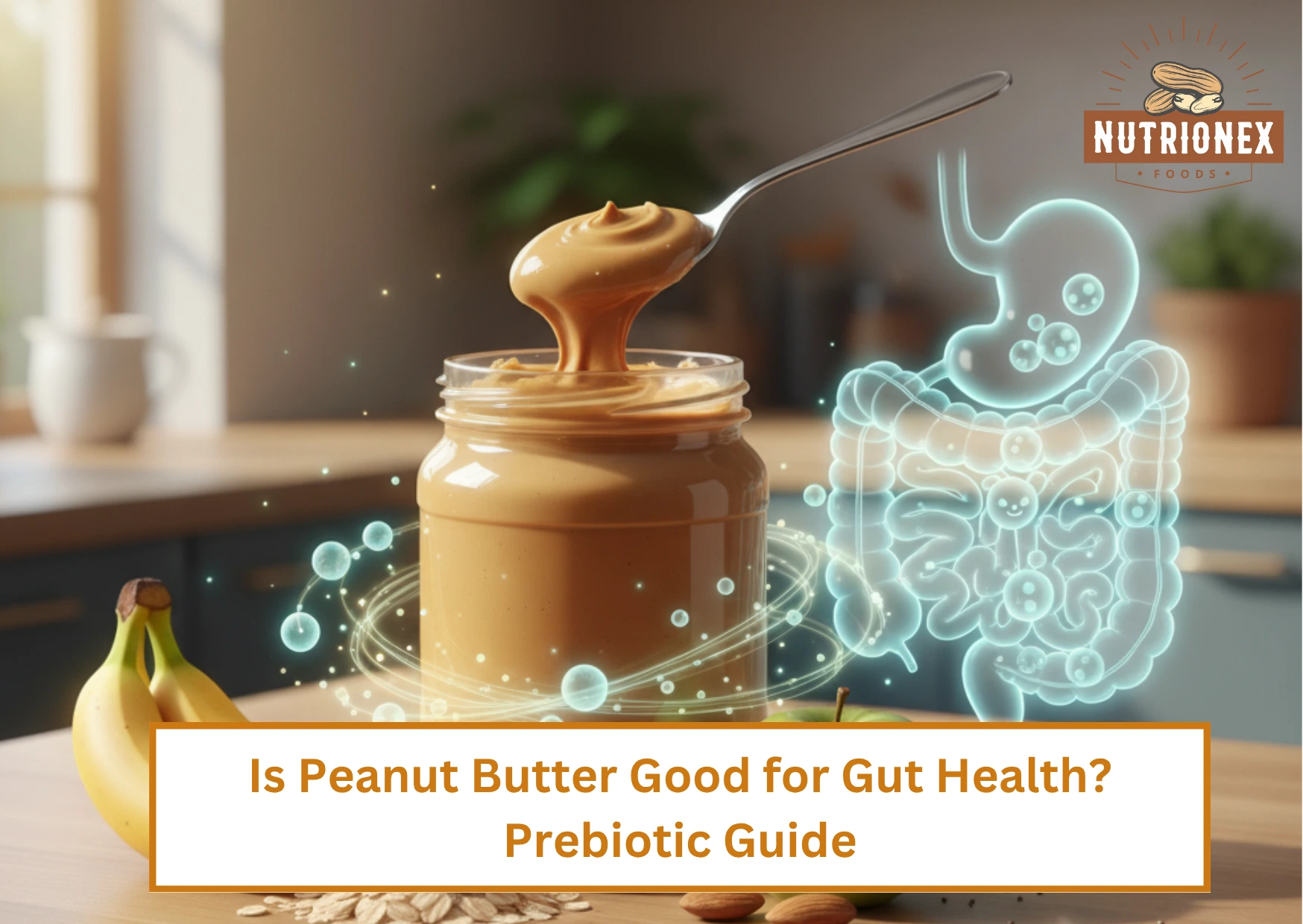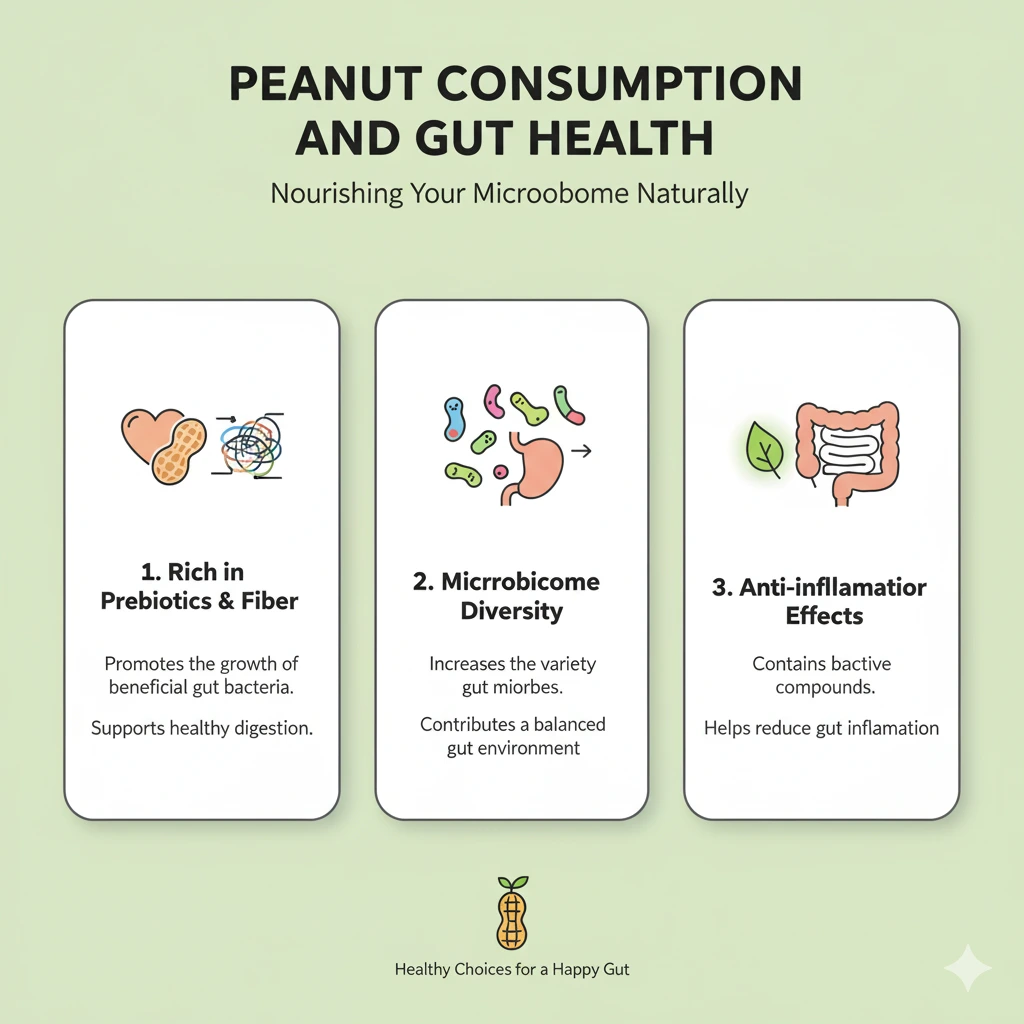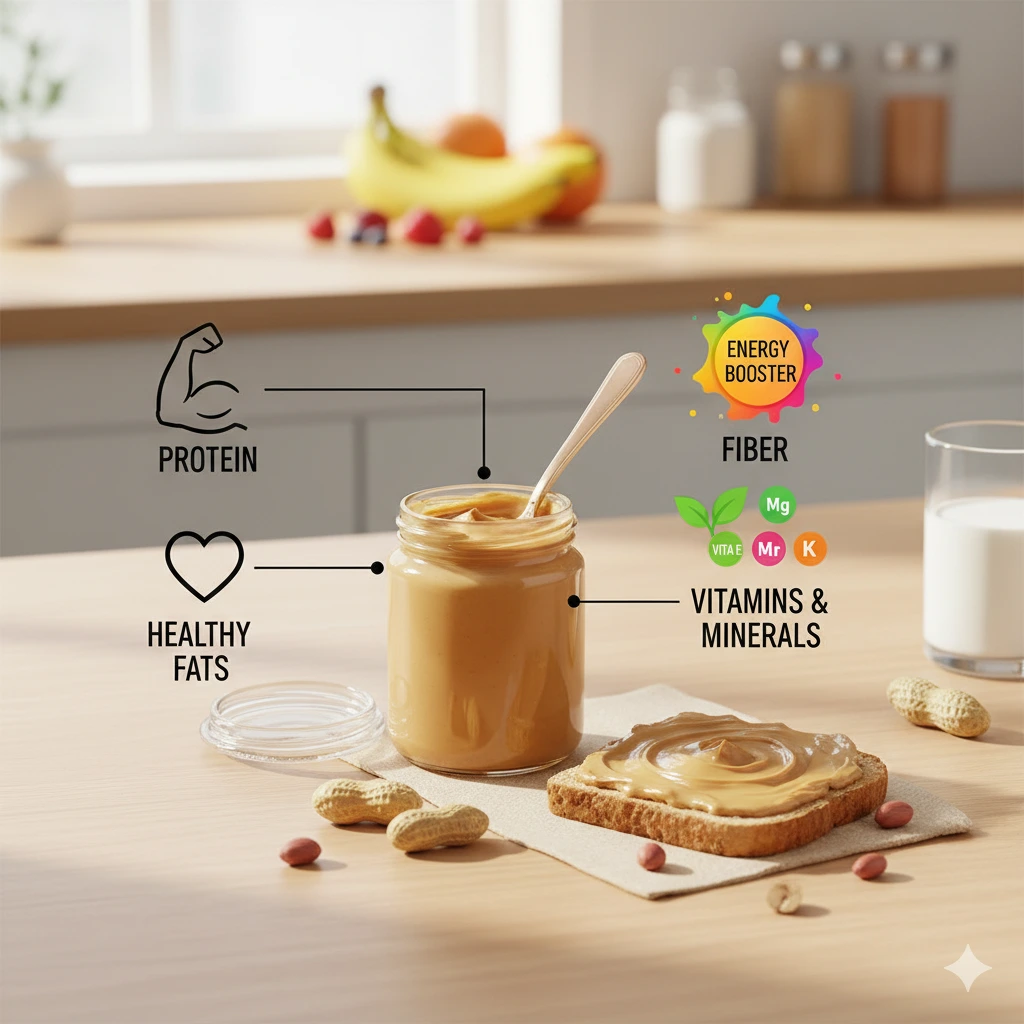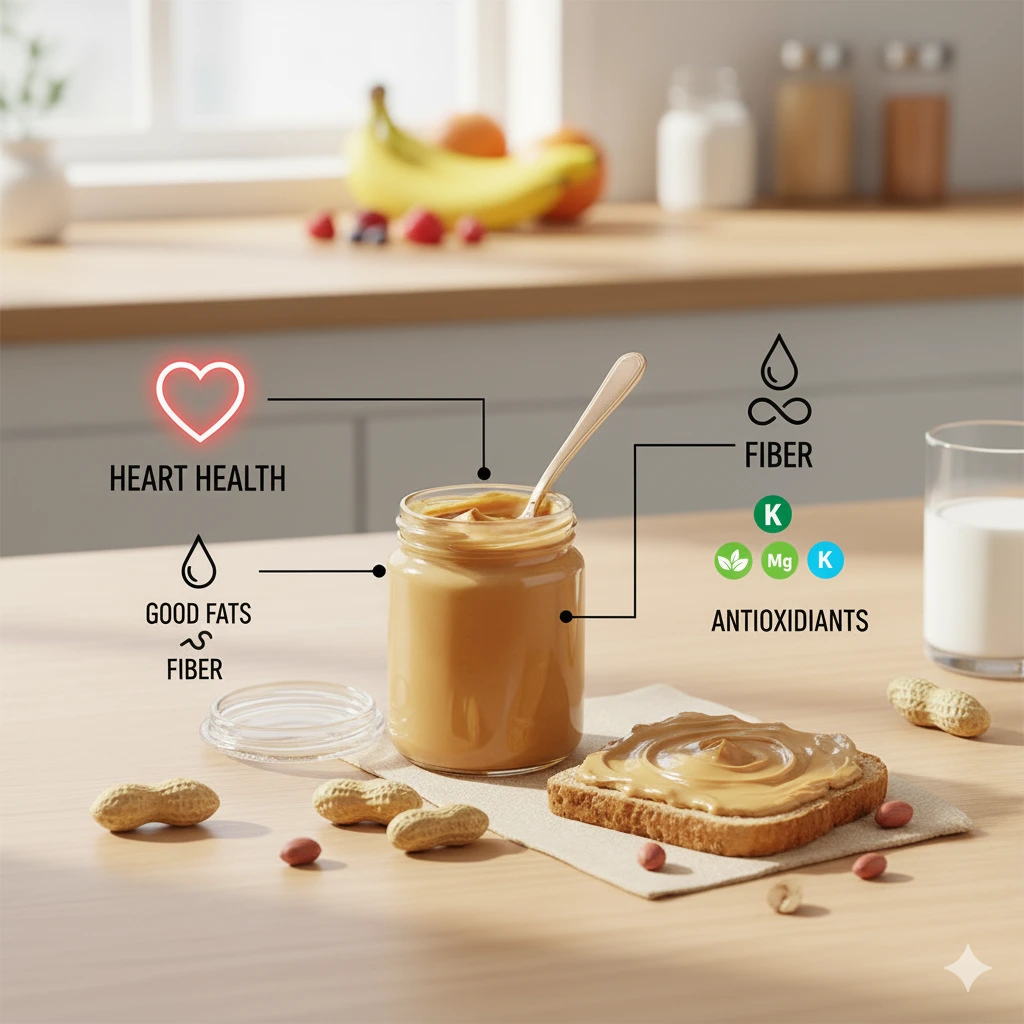
Is Peanut Butter Good For Gut Health? Prebiotic Guide
Introduction to Peanut Butter
Peanut butter is a popular spread made from ground peanuts, packed with healthy fats, protein, and fiber. It also contains essential amino acids, vitamins, and minerals, making it a nutritious choice for a healthy diet.
Paired with apple slices, mixed into oatmeal, or added to yogurt, peanut butter serves as a versatile and satisfying snack. Peanuts and peanut butter are also popular choices for healthy snacks, offering a convenient and nutritious option for those seeking to improve their diet. Eating peanut butter in moderation can contribute to a healthy diet and support gut health. The Peanut Institute has highlighted the health benefits of peanuts, including their potential to positively influence the gut microbiome.
Nutritional Profile of Peanut Butter
Peanut butter stands out as a nutrient-dense food, making it a smart addition to a healthy diet. Just two tablespoons of peanut butter deliver about 8 grams of protein, 16 grams of fat, and 2 grams of fiber, providing a satisfying balance of macronutrients. The fat content is primarily made up of heart-healthy monounsaturated and polyunsaturated fatty acids, which are known to support cardiovascular health and help maintain healthy cholesterol levels.
Peanut butter is among the best foods to include in a nutrient-dense diet. It provides:
-
Healthy fats that support heart health.
-
Protein that aids muscle repair and satiety.
-
Fiber that regulates digestion and feeds gut bacteria.
In addition to its healthy fats, peanut butter is rich in essential vitamins and minerals. It’s a good source of vitamin E, magnesium, and potassium nutrients that play important roles in muscle function, nerve health, and antioxidant protection.
Peanut butter also contains phenolic compounds, which have antioxidant and anti-inflammatory properties that may further benefit heart health and overall wellness. With its combination of protein, fiber, and beneficial fats, peanut butter is a versatile food that can help keep you full and energized throughout the day.
Peanut Consumption and Gut Health

Peanut consumption has long been associated with better cardiovascular health and reduced risk of cardiovascular disease. However, different bodies may respond differently to peanut consumption, so individual tolerance should be considered. The soluble fiber and insoluble fiber in peanuts regulate bowel movements, nourish gut bacteria, and support digestion.
The healthy fats in peanuts and peanut oil also help regulate blood sugar, contributing to better nutrition and improved human health. In one randomized clinical trial, participants who consumed two tablespoons of peanut butter daily experienced positive changes in gut health compared to a control group.
In one randomized clinical trial, participants consuming about two tablespoons of peanut butter daily showed measurable improvements in gut composition compared to a control group. This suggests that peanut butter has a direct impact on the human gut microbiome, making it more diverse and resilient.
The Role of Gut Microbiome
The gut microbiome is vital for overall human health, influencing digestion, the immune system, and even mental well-being. The human gut microbiome composed of trillions of microorganisms living in the gut relies on dietary nutrients to thrive.
Peanut butter offers prebiotic fiber that feeds beneficial gut bacteria, promoting a balanced gut microbiota. A systematic review and meta-analysis of nut consumption revealed that peanuts and other nuts have beneficial effects on gut composition, supporting long-term health benefits.
Prebiotic Properties of Peanut Butter
Peanut butter offers more than just great taste it also has prebiotic properties that support a healthy gut microbiome. The soluble fiber found in peanut butter acts as a prebiotic, feeding the beneficial gut bacteria that are essential for good digestion and overall health. By nourishing these gut bacteria, peanut butter helps promote a balanced gut microbiota, which can lead to a range of health benefits.
Regularly including peanut butter in your diet can help regulate bowel movements and prevent constipation, thanks to its prebiotic fiber content. The phenolic compounds in peanut butter also play a role in supporting gut health by encouraging the growth of beneficial bacteria and creating a healthier gut environment.
These combined effects can boost immune system function, improve digestion, and even support mental well-being, making peanut butter a valuable food for maintaining gut health.
Health Benefits of Peanut Butter

Nutritionally, peanut butter is rich in healthy fats, fiber, and protein, making it one of the foods to add to a balanced meal plan. Including peanut butter in meals can help improve digestion and support gut health by promoting gut microbiota diversity and regulating blood sugar. Research suggests it may lower blood sugar, enhance heart health, and support the immunity level by nurturing gut bacteria.
It also provides vitamins like vitamin E and minerals such as calcium, both important for overall body function. Pairing peanut butter with dark chocolate, which contains flavonoids, can amplify its beneficial effects by further supporting cardiovascular health and heart health.
Impact on Gut Microbiota
Peanut butter is rich in Plant phenolics that positively influence the human gut microbiota. Its prebiotic fiber supports increased abundance of good bacteria, such as Bifidobacterium and Lactobacillus.
One randomized controlled trial demonstrated that nut consumption, particularly peanut butter, could have an impact on gut composition. These changes may reduce risk factors for chronic disease and enhance digestion.
Gut Microbiota and Immune Function
A healthy gut microbiota is closely linked to a strong immune system, and peanut butter can play a supportive role in this relationship. The fiber and Plant phenolics in peanut butter help foster the growth of beneficial gut bacteria, which are essential for optimal immune function and reduced inflammation. By promoting a diverse and balanced gut microbiome, peanut butter consumption can help the body defend against infections and chronic diseases.
Research has shown that peanut consumption is associated with a variety of health benefits, including improved heart health, better weight management, and a reduced risk of diabetes. The antioxidants and anti-inflammatory compounds in peanut butter may also have a direct impact on immunity performance, further protecting the body from illness.
While more research is needed to fully understand all the ways peanut butter influences immune health, current evidence suggests that including it as part of a healthy diet can have a beneficial effect on both gut and immune function.
Risks and Limitations
Despite its health benefits, peanut butter is calorie-dense, with high fat content that can contribute to weight gain if overconsumed. A control group study showed that excessive intake could have negative health outcomes, including elevated risk factors for cardiovascular disease.
Additionally, some people may have allergies to peanuts or be sensitive to added sugar and salt in commercial varieties. Choosing natural peanut butter with only peanuts and minimal ingredients is best for human health.
Other risks include:
-
Peanut allergies, which can trigger severe immune reactions.
-
Added sugar and salt in processed peanut butter, which may negatively affect blood sugar and heart health.
-
Excess calories when paired with high-sugar snacks instead of fruits or whole grains.
To maximize health benefits, opt for natural peanut butter with minimal ingredients ideally, just peanuts.
Heart Health and Peanut Butter

Peanut butter provides monounsaturated and polyunsaturated fatty acids, which can reduce cholesterol and promote heart health. The soluble fiber helps lower blood pressure, reducing risk factors for cardiovascular disease and stroke.
Studies confirm that nut consumption including peanuts and other nuts is linked to lower rates of heart disease. Adding peanut butter to a heart-healthy diet can deliver lasting health benefits without sacrificing taste.
The Importance of Moderation
While beneficial, peanut butter should be consumed mindfully. A portion size of about two tablespoons (or tablespoons spread on fruit or toast) provides nutrients without excess calories. Overeating may cause weight gain or increase risk factors for cardiovascular disease. It's important to consider when you eat peanut butter having it with breakfast or as a snack can help maximize its health benefits as part of a balanced diet.
Pairing peanut butter with fruit, beans, eggs, or whole grains ensures a balanced meal that contributes to overall nutrition and health benefits.
Balanced consumption ideas include:
-
Spread peanut butter on apple slices for a gut-friendly snack.
-
Mixing into beans or stir-fries for added protein.
-
Pairing with eggs or fruit for a nutrient-dense breakfast.
-
Adding to smoothies to enhance nutrition.
The Future of Peanut Butter Research
Although promising, more research is needed. Upcoming systematic reviews and meta-analyses should explore the impact of peanut butter on the gut microbiome over periods like four weeks or six weeks. Researchers emphasize the need for strong evidence across populations to validate its beneficial effects.
Future clinical trial designs should also include diverse age groups to better understand long-term effects on digestion, immunity, and heart health.
Choose Your Peanut Butter Flavour
Final Thoughts and Considerations
Peanut butter is more than a tasty spread it’s a nutrient-dense food that supports the gut, immune system, and cardiovascular health when eaten in moderation. Its prebiotic fiber, phenolic compounds, and fatty acids work together to promote human gut microbiota balance and overall health benefits.
When paired with healthy foods like fruits, whole grains, or yogurt, peanut butter can be part of the best foods for maintaining a healthy human gut microbiome. As researchers found, moderation is key, but the evidence suggests peanut butter is a valuable addition to a healthy diet.
As a trusted peanut butter manufacturer, we at Nutrionex Foods understand the importance of combining taste with nutrition. Peanut butter is more than a creamy, satisfying spread it can play a supportive role in gut health. Packed with fiber, healthy fats, and natural compounds that act as prebiotics, our peanut butter helps nourish the good bacteria in your digestive system, promoting better digestion and overall wellness.
People Also Ask
1. Can peanut butter affect diabetes?
Yes, it may help manage blood sugar and reduce diabetes risk when eaten in moderation.
2. What do meta-analysis studies say about peanuts?
They show peanuts support a healthier gut microbiota.
3. What is the difference between gut microbiota and gut microbiome?
Microbiota are the microbes, while the microbiome is their genetic material.
4. Are two tablespoons of peanut butter enoug daily?
Yes, two tablespoons provide benefits for gut and overall health.
5. Is peanut oil good for digestion?
It has healthy fats but lacks fiber, so it’s less effective than peanut butter.
6. Do nuts increase good gut bacteria?
Yes, nut consumption increases beneficial gut bacteria.
7. Are apple slices with peanut butter good for digestion?
Yes, the fiber in apples plus peanut butter supports gut bacteria.
8. Do peanuts boost the immune system?
Yes, their phenolic compounds and fiber support immunity.
